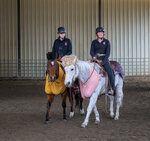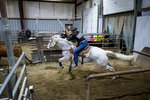


For Greer Swoboda and her teammates, Alma McKean, Kira Potter and Faith Smith, spring was a busy and exciting time. Swoboda and McKean were getting ready to graduate from Cascade High School, and all four girls had multiple four-day meets for WAHSET, which stands for Washington State High School Equestrian Team, and is made up of students from multiple districts. After training and preparing all fall and winter, if riders and their horses do well in the spring district meets, they qualify for State and then have a chance to go onto Regionals, where the best of Washington and Oregon face off.
Swoboda has collected many ribbons and trophies over the years, being a versatile and fierce competitor. She said, “My freshman and sophomore years there were no Regional competitions due to COVID, but last year I made it to Regionals in breakaway roping, and this year I made it in working rancher and my team made it in drill.”
To help understand the diversity of events in horseback riding, Swoboda explained, “There are three cattle events, (breakaway roping, team sorting, and steer daubing), five individual gaming events (barrel racing, pole bending, key hole, international flags and figure 8) and two team gaming events (biwrangle and Canadian flags), and a bunch of performance events in both English and Western disciplines. This year, I competed in working rancher, barrel racing, pole bending, key hole, individual flags, breakaway roping, steer daubing, team sorting, in hand obstacle relay, Canadian flags, biwrangle, working pairs and drill.”
So, a mere six days after graduation, Swoboda and her teammates headed to Redmond, Oregon for Regionals. It started off a bit bumpy when the caravan of trailers took eleven hours to reach their destination instead of six due to a brake issue followed by a flat tire.
Competition days are long, starting early and getting to bed late, and riders have to put their horses first and their own needs second. Each day is dedicated to certain events.
Working rancher, one of Swoboda’s best events, isn’t timed but involves performing patterns perfectly, communicating with one’s horse to do things like going over a bridge or obstacles, opening and closing a gate, backing up, and roping a dummy cow. Swoboda placed 4th at Regionals for this very technical category.
Canadian flags is a four-person relay, with one rider and horse going out at a time to snatch a three foot flag from the ground as quickly as possible and then tagging off to the next teammate. Fastest total time is the goal, and can be greatly hampered if the flags get knocked over by a mis-stepping horse so that riders have to dismount in order to retrieve fallen flags. Swoboda’s team ran it perfectly at two different competitions, but they didn’t quite qualify for Regionals.
Steer daubing, another of Swoboda’s specialties, involves chasing a steer (young neutered male) that has a slight head start from its pen, reaching over and tapping its back with a so-called pancake batter stick leaving a white mark. Time is over when the rider lifts her stick back up in the air. “It’s glorified but basically could be used to give topical medication like tick, fly and worm medicine when you don’t want to have to fully capture the cow,” explained Swoboda.
Swoboda and her teammates were happily surprised to make it to Regionals in drill. They worked really hard for months on their synchronized routine which lasts close to six minutes. They had practiced it almost every day after practicing other individual or paired events. At Regionals, they almost missed their chance to do a practice run, and wound up having to do it at midnight. It went well, though they were not used to the huge arena—it affected their spacing and how close to the center they were. As one of the captains, Swoboda shouted quick commands to help her team with alignment and to prepare for the next element in the routine.
The earlier State meet, held at the Moses Lake fairground, was packed with participants and spectators, because for each event there were up to five contestants from each of the seven districts. Regionals, by comparison, had fewer riders—only the top five from Washington and the top five from Oregon competed in each event. The Deschutes County Expo Center in Redmond stages professional rodeos, so it felt like a whole other level, with three competition arenas and multiple warm up arenas.
To be one of the best riders in the state has taken a lot of dedication. “I practiced around ten to twelve hours a week, not including the two hours roundtrip it took to drive up to Wenatchee with a truck and trailer to get the horses to practice each day. It’s definitely worth it to get that amount of practice in because horses are such complicated animals, you have to learn to work as a team with them, which takes a lot of time.
“Because I did so many different events, I had more practices than some of the other members. I would have roping practice Tuesday, sorting practice Wednesday, gaming practice Thursday, drill and performance practices on Sunday with the occasional Monday mixed in.”
Swoboda works with several horses, each with a unique personality and skill set suited for certain events. She rides Pepsi for working rancher, breakaway roping and steer daubing because Pepsi has been trained on cows and likes having a job. Roany is a good horse for sorting because she’s little and can turn sharply. Lucy is used for the team drills and some gaming events like keyhole because she’s a great sprinter.
“I’m so thankful for the horses I work with,” she said. Pepsi was the first horse she rode a lot, but when Pepsi was lame her freshman year, her family got Roany and another horse from Entiat and trained them a lot because they had been “pasture pets.” Lucy is owned by a friend of her mom’s and “can do anything.”
No matter the length of the event, whether a few seconds or multiple minutes, a good competitor makes it look effortless. “More work goes into it than what it looks like,” said Swoboda. “That’s the point. You’re constantly using these little muscles in your legs to tell your horse to move a certain way. And they really get to know you. They feel your excitement or nervousness and react to that.”
WAHSET teaches these riders self-discipline and self-reliance. “WAHSET is like a family. The coaches are passionate and there to help you succeed. There aren’t a lot of horse people in the valley, so WAHSET is a tight community.”
For her next chapter after a summer of working on a Forest Service fire crew, Swoboda is heading to Montana State University and is considering joining the rodeo team there, or finding a dude ranch for a part-time job. No matter what, she expects horses will always be a part of her life.
Comments
No comments on this item Please log in to comment by clicking here